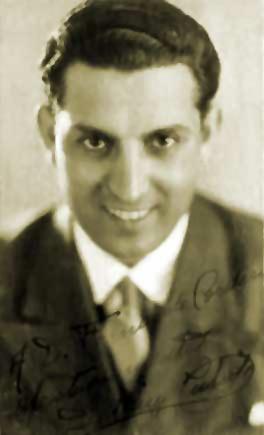The Spanish tenor Delfín Pulido Rivas was born in Santa Cruz de la Zarza (Toledo) on 23 December 1897. He belonged to a modest family,
his father was a blacksmith. The young Delfín worked with his father until he was called for military service and then was sent to
Morocco and fought in the Rif War.
Back in Spain, he studied singing with José María Elvira and started his career in opera. He made his debut in the last season
of the old Teatro Real in Madrid on 23 December 1924 singing the Duke in Rigoletto with Luisa Pasini, Carlo Galeffi and Alexander
Griff.
He travelled to Milan and was chosen among twelve young tenors for a tour of several Italian cities. His repertoire included L'elisir
d'amore, La sonnambula, L'amico Fritz, Il barbiere di Siviglia, Lucia di Lammermoor and Don Pasquale.
He then returned to Spain and as the Teatro Real was closed, an opera season was organized in Madrid at the Teatro Apolo. Pulido was engaged
to sing Almaviva in Il barbiere di Siviglia with Angeles Ottein, Víctor Damiani, Manola Guardiola, Aníbal Vela and Carlos
del Pozo. The first performance took place on 16 January 1926.
While Pulido was in Madrid, the first performance of a new zarzuela by Jacinto Guerrero took place at the Teatro Apolo: El huésped
del sevillano, on 3 December 1926, with the sopranos Selica Pérez Carpio and Rosario Leonís. The new work was warmly received
except for the Mexican tenor Ricardo G. de Lara who sang the role of Juan Luis and was a complete failure. In despair, the composer called
Pulido, who learnt the role in 24 hours and was enthusiastically received by the audience and critics. His success was so great that he has
always been considered as the tenor who sang this zarzuela in the first performance. He sang more than 150 performances of El huésped
del Sevillano only at the Apolo, and then hundreds more throughout Spain.
Several Spanish composers asked him to sing in the world premieres of their new zarzuelas, among them:
Los de Aragón by José Serrano. Teatro del Centro (Madrid), 16 April 1927.
Role: Agustín (with María Badía)
Las hilanderas by José Serrano. Teatro El Dorado (Barcelona), 3 December 1927. Role: Leandro (with Flora Pereira and Rosario Leonís)
La marchenera by Federico Moreno Torroba. Teatro de la Zarzuela (Madrid),
7 April 1928. Role: Don Félix (with María Badía and Felisa Herrero)
Al dorarse las espigas by Francisco Balaguer. Teatro Principal (Zaragoza),
15 September 1928. Role: Peniya (with Felisa Herrero and José Luis Lloret)
El romeral by Fernando Díaz Giles. Teatro de la Zarzuela (Madrid), 18 June 1929. Role: Anselmo (with Felisa Herrero)
Baturra de temple by Federico Moreno Torroba. Teatro Circo (Zaragoza), 5 November 1929
In 1931 he formed a zarzuela company with the soprano Felisa Herrero and the baritone José María Aguilar and organized a tour
of Central and South America. In Buenos Aires, they sang at the Teatro Mayo and the Teatro Avenida.
The Spanish Civil War (1936–39) surprised him in besieged Madrid and, consequently, during those years his activity was inevitably
reduced, but yet he obtained triumphs singing zarzuelas like Doña Francisquita and Los claveles at the Teatro
Pardiñas in Madrid, or the operetta La casa de las tres niñas/Das Dreimäderlhaus (with music by Schubert, and
known in English as Blossom time or Lilac time), sung in Murcia in 1936 with the company formed by the baritone Pedro Terol.
Only for having sung in Madrid (under a Republican government) during the Civil War, he could not sing in Spain for several years after the
war. This unfair treatment filled him with bitterness, and he made up his mind not to sing anymore. He started a new career as a teacher of
singing.
In 1943 he participated in a Spanish film: "Canelita en rama" with a cast that included Juanita Reina, Pastora Imperio and José
María Seoane. I assume it was a character role and without singing at all.
Pulido married Emeina Hijón and they had three children.
Delfín Pulido died, completely forgotten, on 18 November 1986, at 88 years old.
Pulido's voice was warm and very pleasant in quality and color. He possessed a correct technique that allowed him to sing the lyric repertoire
in opera and most of the zarzuela repertoire without problems. It is said that his voice was rather short and light, but it had enough weight
for the music he sang. He was a distinguished tenor in Spain, during hard competitive times. The great tenors Fleta, Lázaro and Cortis
were still active and sang zarzuela whenever it was necessary. And then we have Pau Civil, Tino Folgar, Juan García, Emilio Vendrell,
Pepe Romeu, Rogelio Baldrich, Faustino Arregui, Juan Rosich, Cayetano Peñalver, Juan de Casenave, Ricardo Mayral, all very good tenors
who made careers in opera and zarzuela during the late 1920s and 1930s.
Pulido left more than 50 sides of zarzuela and songs, most of them completely unknown to collectors. I have been able to gather the details
for about half of them in what could be called a preliminary discography.
Juan Dzazópulos
